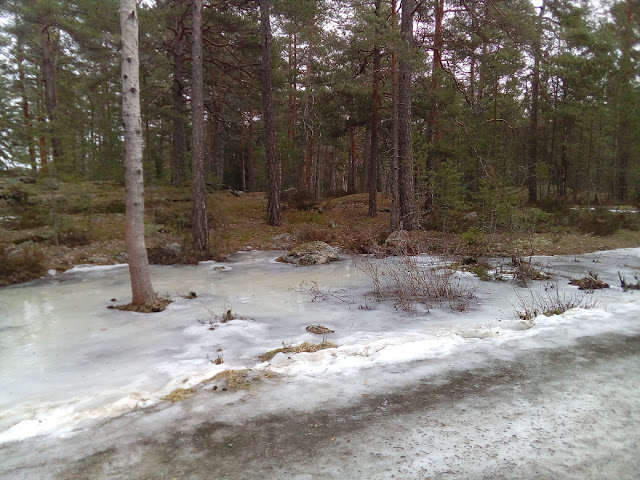One of the books I read in my Modernist Swedish Literature course a million years ago was
Aniara. Since we were still babies in the Swedish language, everything we read was an English translation. To this day I don't know how The Swedish Program at Stockholm University managed to find enough copies—actual proper hardback copies, not dodgy spiral-bound printouts—of the English translation for all of us. These days the only English version available anywhere seems to be an ugly paperback edition that fetches a whopping $225 on Amazon.
 |
| I wish this would go back into print so my anglophone sci-fi fan friends could afford to read it. |
I'll be the first to admit that I didn't quite appreciate reading
Aniara at the time. I love sci fi but I'm extremely unconvinced by poetry, so the whole thing left me tepid. Now that I'm older, I appreciate not only the weirdness of the project (an epic poem about a pioneer ship lost in space!) but the metaphorical aspect of the whole piece in the face of the threat of nuclear winter and environmental annihilation.
I only learned that there was an
Aniara movie after I saw a poster for it at ABF after my writing Meetup. My timing was excellent: Bio Rio only has two showings and both of them are in February. There's one more screening on 15 February, for those of you in Stockholm who are free at 3 in the afternoon on a weekday. I'm not, so I had to grab last-minute tickets to the evening showing this past Saturday. I also, at the very last minute, tracked down a copy of the Swedish original from the library so I could go into the movie with a refreshed memory.
Aniara the movie is a graceful companion to
Aniara the epic poem, if not least to provide visuals that help anchor the story (as much as there is one). Specifically, the movie illustrates the sheer vastness of everything far better than words maybe ever could. Martinson gives some details—a ship with 8,000 people on board, 15,580 feet long and 2,923 feet wide—but it's hard to really appreciate, on the emotional and intuitive level, what those numbers really mean. The establishing shots of huge milling crowds in a huge, outsized version of a Viking Line cruise ship, however, suddenly makes it crystal clear. The poem also does very little to specify the actual specifics of the ship, aside from the fact that it has crystal-clear windows and walls over must of it. Thanks to a steady childhood diet of mid-century science fiction movies, I always imagined the interior of Aniara as a very minimalist, brushed chrome sort of space ship; the option to represent the ship as an opulent, futuristic echo of today's booze cruises was an inspired one and provided a nice visual irony in the later years of the ship's voyage.
References and quotations from the poem fit into the movie quite elegantly, whether in events and plot points or pieces of dialogue. The screenwriters opted to ground things in the particular story arc of the Mimarob—the employee who operates the Mima, which in the movie is the equivalent of the holodeck from
Star Trek but in the poem is more like a fancy movie theater. The change works well; the vague nameless "we" in many of the poems is enough to track when you read, but in a movie it helps to have at least one central character we can follow throughout. The choice of the Mimarob for such a protagonist also makes sense; on the rare occasion a singular "I" turns up in the poem, it's usually the Mimarob.
I didn't finish re-reading
Aniara entirely beforehand, so I can't say whether some of the grimmer plot points were also alluded to in the poem or if they were added for dramatic purposes. But it doesn't seem worth harping on grimness when we're talking about an adaption of an epic poem where everyone ends up lost in space forever.
Like
2001 and
Arrival, the film version of
Aniara succeeds in complementing the original text it's based on, so that instead of competing to tell the singular best version of an idea, both versions become one cohesive whole. Watch the movie and, if you can, read the book.









